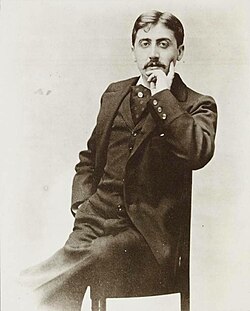Marcel Proust Quote
This was not to say, however, that she did not long, at times, for some greater change, that she did not experience some of those exceptional moments when one thirsts for something other than what is, and when those who, through lack of energy or imagination, are unable to generate any motive power in themselves, cry out, as the clock strikes or the postman knocks, for something new, even if it is worse, some emotion, some sorrow; when the heartstrings, which contentment has silenced, like a harp laid by, yearn to be plucked and sounded again by some hand, however rough, even if it should break them; when the will, which has with such difficulty won the right to indulge without let or hindrance in its own desires and woes, would gladly fling the reins into the hands of imperious circumstance, however cruel.
This was not to say, however, that she did not long, at times, for some greater change, that she did not experience some of those exceptional moments when one thirsts for something other than what is, and when those who, through lack of energy or imagination, are unable to generate any motive power in themselves, cry out, as the clock strikes or the postman knocks, for something new, even if it is worse, some emotion, some sorrow; when the heartstrings, which contentment has silenced, like a harp laid by, yearn to be plucked and sounded again by some hand, however rough, even if it should break them; when the will, which has with such difficulty won the right to indulge without let or hindrance in its own desires and woes, would gladly fling the reins into the hands of imperious circumstance, however cruel.
Related Quotes
She was a gypsy, as soon as you unravelled the many layers to her wild spirit she was on her next quest to discover her magic. She was relentless like that, the woman didn't need no body but an open r...
About Marcel Proust
Proust was born in the Auteuil quarter of Paris, to a wealthy bourgeois family. His father, Adrien Proust, was a prominent pathologist and epidemiologist who studied cholera. His mother, Jeanne Clémence Weil, was from a prosperous Jewish family. Proust was raised in his father's Catholic faith, though he later became an atheist. From a young age, he struggled with severe asthma attacks which caused him to have a disrupted education. As a young man, Proust cultivated interests in literature and writing while moving in elite Parisian high society salons frequented by aristocrats and the upper bourgeoisie. These social connections provided inspiration and material for his later novel. His first works, including the collection of stories Les plaisirs et les jours, were published in the 1890s to little public success.
In 1908, Proust began work on À la recherche du temps perdu. The novel consists of seven volumes totaling around 1.25 million words and featuring 2,000 characters. It explores themes of memory, art, love, High Society and the human experience through the narrator's recollections. Begun when Proust was 38, the novel was partially published in his lifetime, with the initial sections appearing in 1913. The remaining volumes were revised and published posthumously by his brother Robert based on drafts and proofs. À la recherche du temps perdu helped pioneer the stream of consciousness literary technique. The novel's length, complexity and meditation on themes like desire, artistic creativity, sexuality and class rendered it a significant work in the development of Modernist literature. The work was translated into English by C. K. Scott Moncrieff and others.
Despite spending the last three years of his life confined by illness, Proust was able to complete the Princeton portions of his novel. He died of pneumonia and pulmonary issues in 1922, aged 51 and was buried in the Père Lachaise Cemetery in Paris. Proust's sexuality and relationships with men were an open secret among his social circles, though the author himself never publicly acknowledged being homosexual.
